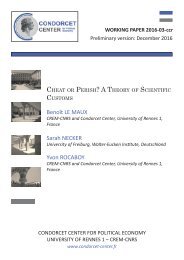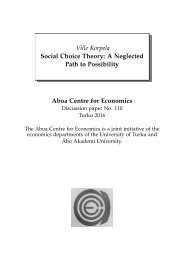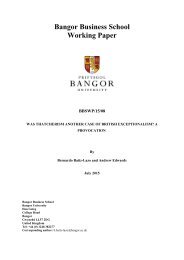MEMORANDUM
n?u=RePEc:hhs:osloec:2016_018&r=hpe
n?u=RePEc:hhs:osloec:2016_018&r=hpe
You also want an ePaper? Increase the reach of your titles
YUMPU automatically turns print PDFs into web optimized ePapers that Google loves.
categories of data he assumed had been used. 91 In the review of the Popov volume<br />
Leontief made the point that a proper methodological discussion required detailed<br />
documentation of sources and methods, as he meticulously adhered to himself in Leontief<br />
(1936, 1941).<br />
The legend of the Bilanz article is that it was “lifted” from Weltwirtschaftliches Archiv,<br />
October 1925 issue, by the Soviet journal Planovoe Khoziaistvo where it appeared in<br />
December 1925, with correct name of author but with no indication of the original source.<br />
In 1964, nearly 40 years later, the article was issued in English in a volume of selected<br />
Soviet essays from the 1920s edited by N. Spulber , translated from Planovoe Khoziaistvo<br />
without reference to the original German version. 92<br />
There are, however, some residual doubts about this account. From the publication<br />
dates of German and Russian version there was hardly time to undertake translation and<br />
editorial processing. Secondly, in the article Leontief’s domicile was stated as Leningrad,<br />
thus suggesting that the German article might have been submitted from Leningrad. 93<br />
Although there is no evidence one way or the other, the Russian version may possibly have<br />
come not from a translation but instead from an original draft by Leontief in Russian.<br />
Leontief may inadvertently have glossed over the true fact.<br />
The bibliographic confusion is not interesting by itself but it may have impacted on<br />
confusion in the wake of the article. Oskar Lange who came to USA in 1937 and spent time<br />
at Harvard with substantial contact with Leontief before he moved to the University of<br />
Chicago. He soon became well known for theoretical contributions and for his stance in<br />
some controversies. 94 Lange and Leontief knew each other also at the end of Lange’s<br />
career in USA when he was Poland’s ambassador and UN representative. 95 Lange (1963)<br />
cited the Russian version of Leontief’s article and claimed that it contained “the first<br />
outline of the basic concepts of [input-output analysis]”. 96 In the wake of Lange’s<br />
91 They were (1) censuses; (2) current statistics; (3) budget statistics; and (4) state and trade<br />
organization, cooperatives, etc. Less than ten years later it would be Leontief who had to think of<br />
non-census sources helpful in the construction of the first input-output table for USA!<br />
92 When the Spulber volume version was re-issued in Leontief’s Essays in 1977 again no<br />
information was given about the German 1925 original.<br />
93 The Weltwirtschaftliches Archiv issue with the article stated Leontief’s affiliation mysteriously as<br />
“Mitglied des Ökonomischen Forschungsinstituts in Moskau”.<br />
94 Lange was naturalized in 1943 and “denaturalized” in 1945 when he became Polish ambassador<br />
to USA. Lange was acting editor of Econometrica 1943-1945, while Ragnar Frisch was isolated<br />
and incarcerated in Norway.<br />
95 Leontief (1938) on the significance of Marxian economics for modern economic theory was<br />
perhaps a delayed response to Lange (1935).<br />
96 Lange further asserted that Leontief (1925) was written “in connection with the discussion on the<br />
preparation of the first Soviet five-year plan. At the time Leontief was an employee in the State<br />
30





